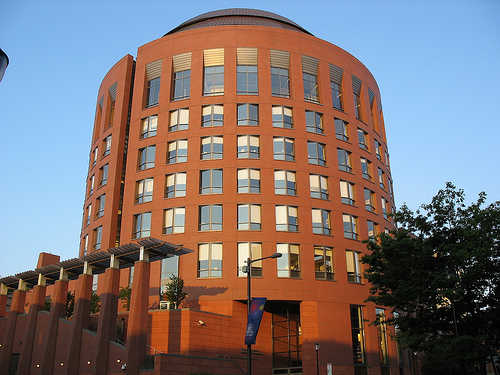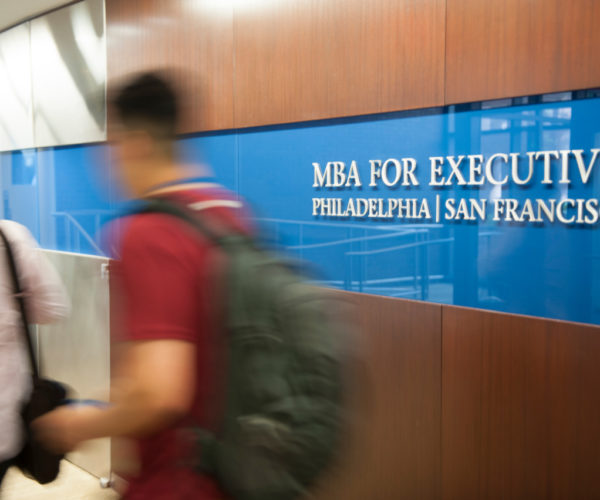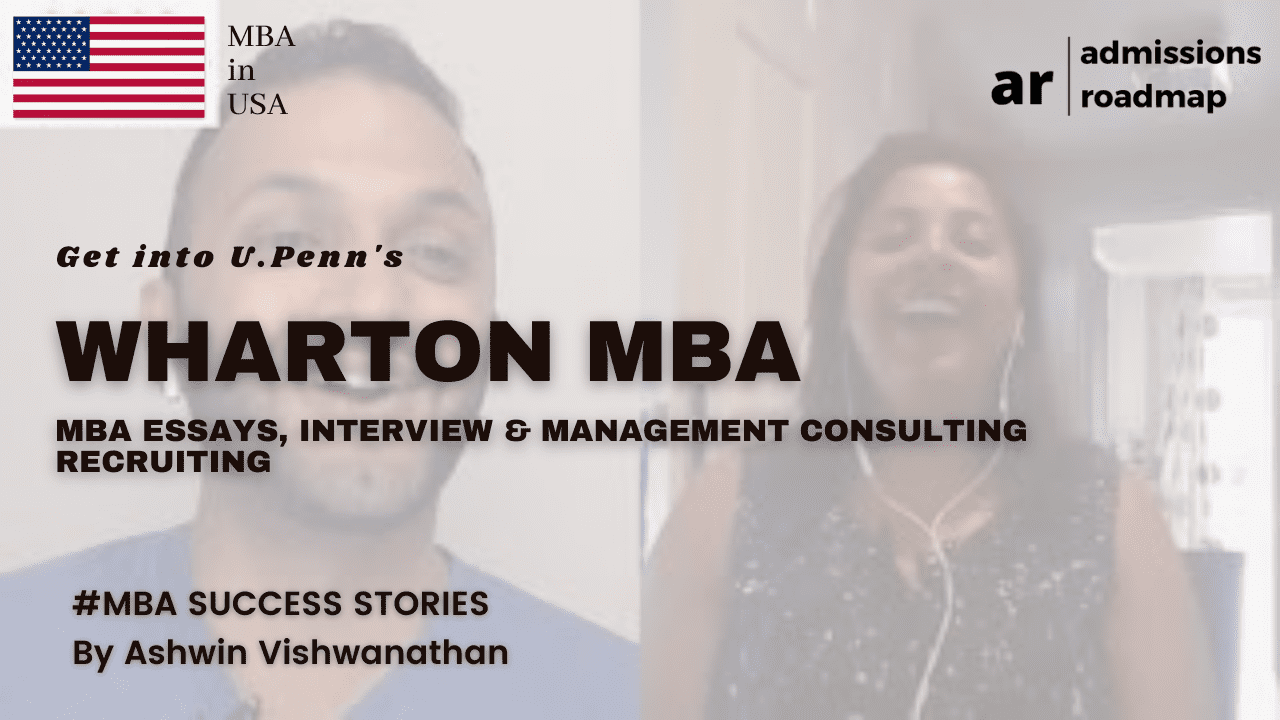There is no doubt that impressive test scores can only help in the application process at a top-ranked business school such as Wharton. However, the truth is that MBA programs don't admit applicants based on any one factor in isolation. Furthermore, business schools generally seek to create a dynamic environment for their students, one that reflects the real world. So, while common trends certainly exist across most MBA programs , business schools still value students with diverse backgrounds, perspectives, and experiences. Thus, there are numerous factors that business school admissions committees weigh when deciding who makes the cut.
From Wharton's essay questionsto the interview process, it is important to show that you have a career path in mind. Students who indicate that they have "so many ideas that they don't know where to start" come across as unfocused and non-directed. The Wharton Vice Dean once famously said at Convocation, "If we only granted diplomas to those of you who had followed your suggested career paths from your applications, no one would actually graduate!
" The beauty of a transformational business school education is that it does give you tremendous exposure to possibilities on a professional and personal level. However, Wharton admissions officers want to ensure that you can create a viable path to follow – understanding that while the actual industry and functions are variable, you should enter the program with a sense of purpose. Business school has been likened to drinking water from a fire-hose, and those who come in with no plan at all are frequently forced down by the blast. It is advisable to give as much detail as you can about next steps in your career, showcasing that you understand what the Wharton program will enable you to do along the way. In a case like that, shooting for a top-notch Quant score, say a score of 50 or 51, would probably be a smart play. Keep in mind that top MBA programs typically prefer to see GMAT Quant scores of 47 or higher, so if your quant background is weak, aiming for the higher end of the scale makes a lot of sense.
Such a score could go a long way in alleviating any worries admissions might have that you wouldn't be able to handle rigorous, graduate-level classes focused on subjects such as finance, economics, and statistical analysis. Then you might really have an edge, because you would be showcasing strong quantitative skills and uncommon verbal abilities. The Wharton application season includes three rounds that usually occur in early September, early January and late March; those interested in the Lauder Program must submit their applications in the first or second round. Applicants should apply through Wharton's online application system and are required to fill out a data form concerning both their personal and professional background.
Wharton also requires applicants to provide transcripts from all academic institutions attended, GRE or GMAT scores, TOEFL results if applicable, two essays, a résumé, two letters of recommendation and a $275 application fee. An interview is required for admittance to the MBA program, and interviews are offered to applicants by invitation only. University of Pennsylvania Wharton Business School is a top five business school located in Philadelphia, Pennsylvania. Wharton's diverse program is well known for its large alumni body and its expansive list of specializations.
It is a school that brings together leading influencers and minds across varies industries. Use our guide to find out if Wharton is the right school for you. Find out about what makes Wharton different and what the admissions committee is looking for. Two of the key personal qualities that Wharton will look for are personal introspection and clarity of thought. Your essays are a great place to show that you've spent time to analyze your own strengths and weaknesses, examined your opportunities, and carefully decided that business school is the best path to achieve your unique goals. In particular, the second essay gives you a chance to show the admissions committee what unique qualities or traits you could contribute to your Wharton class.
LEAD program admissions are coordinated through the LEAD Program in Business, Inc. For LBW, Wharton selects candidates based on academic excellence and leadership skills. The management & technology program selects applicants interested in bringing together management and tech concepts. For the Moneyball Academy and WSBA programs, academic transcripts, extracurricular activities, essays, two recommendations, and English competency test scores are required with the application. If your undergraduate college is listed above, that means that Wharton has accepted many applicants with your education background in the past.
During the application cycle for Wharton's class of 2022, 7,158 people applied to the full-time MBA program, and 916 enrolled. The average student had five years of work experience, a 722 GMAT score, and a 3.6 undergraduate GPA. Just like at any other business school, though, students who enrolled had a broader range of test scores, GPAs, and amount of work experience.
So, a GMAT score on the higher end of the class range could be a "gold star" on your application — and a much-needed one, if your applicant profile is weak in other areas. Of course, if your GPA is lower than the average and your work experience is lacking, an impressive GMAT score may not be enough to get your foot in the door. Next, she homed in on prepping for the MBA program's in-person interview and carefully chose who would write her business school recommendations. Zimbler Miller believes the same strategy can help other applicants."Do an honest review of your strengths and weaknesses in terms of what Wharton might be looking for in MBA candidates," she said. "Then work on filling in those gaps before applying, emphasizing your unique strengths."
The UPenn Wharton average GPA is 3.6 out of 4.0 for the most recent class of admitted students. GPA is important but not the sole indicator of academic strength. You can't do anything to change your undergraduate GPA now so work on the other parts of your application to balance out your less-than-average GPA. You'll need to show the admissions committee that you can not only handle the work that Wharton has in store, but also that you'll thrive in the academic environment. The admissions committee wants to make sure that every applicant will be able to hold their own in these settings.
MBA students are required to tailor their studies by choosing a major or double major from among 19 areas of study and completing at least five credit units in each major area. The 19 major options include the "individualized major," an opportunity for students to complete their majors in an area not adequately covered by the more standard offerings. Nearly 5 percent of students choose to pursue this path, while about 40% of students opt to double major. Wharton runs a range of MBA programs that include the full-time MBA, MBA for executives, joint degree programs (MBA/MA) in international management and arts and sciences, MBA/law program, and MBA/public administration. The school also runs pre-college programs, undergraduate programs in economics, and dual-degree programs in international studies and business, management and technology, and life sciences and management. For instance, as we saw when we looked at the Wharton MBA class profile, the average GPA and professional experience of Wharton's class of 2022 were no less impressive than the average GMAT score.
And you can bet that those applicants came with stellar recommendations and won admissions officers over with polished application essays, too. The fact is, meeting the average GMAT score isn't a guarantee of admittance to any MBA program, much less a top program. Many students are interested in the business school's healthcare management programs (a prominent program in Wharton's MBA program).
It's important to know that it's the only major to operate in that capacity. The rest of the majors that you would apply to under the Wharton MBA program major heading anything from finance, entrepreneurial management, general management operate very differently. Wharton was among the first business schools in the US to implement a team-based discussion component as part of the interview process. In it, five to six applicants discuss a topic while admissions committee members observe.
Luckily, it's also true that a lower-than-average GMAT score doesn't necessarily spell doom. We already saw that there was a 250-point swing in the GMAT scores of students accepted to Wharton's MBA program. So, clearly some students were exceptional enough in other areas of their applications to earn a seat despite GMAT scores that fell well below the average of admitted applicants. Perhaps they had impressive careers and certifications such as CPA/CA/CFA. Perhaps they came from an underrepresented background or industry and had advanced degrees or perfect GPAs.
Prospective Wharton candidates apply in their senior year of high school either through the early decision process or regular decision process. These candidates are then grouped with a pool of applicants separate from those applying to the University of Pennsylvania's College of Arts and Sciences , School of Engineering and Applied Science , or School of Nursing. Each of the other three schools also forms its own separate pool of applicants.
The holistic review process at Wharton lends itself to the program's desire to bring in a class with top-notch candidates from many professional, educational, social and cultural backgrounds. They are also looking for individuals with personality (and a life outside of work!), who contribute to the diversity of the classroom and campus experience at Wharton. Maybe you're passionate about a specific organization or cause and to this you devote much of your free time – or maybe it's triathlons, caring for family or running a business.
Highlight whatever it is you love to do in your free time and how that makes you unique. If the activity itself doesn't feel particularly unique or glamorous, perhaps what differentiates your participation is why the activity is important to you. The program seeks students who are innovative, intellectually curious, and ready to take professional risks while impacting the world. If you're a prospective student, you can learn many key facts and figures — such as the average mean GRE score (163 verbal; 162 quant) and the average undergrad GPA (3.6) for the class of 2020 — from the Wharton website.
How To Get Into University Of Pennsylvania Wharton The site is also a great resource to begin studying the admissions process and requirements. But while the website gives you a starting point for your goal of being accepted into this prestigious program, nothing beats getting the inside scoop from successful applicants who beat the tough odds and earned a coveted Wharton MBA. Wharton is known for its community orientation, and it offers attractive scholarships to students planning to work in the public sector after graduation. The school is also known for complete transparency in the admissions process – the admissions office is always available to applicants and is very open towards them. One of the attributes the school looks for in applicants is maturity and professional experience, resulting in a relatively high average of years of work experience among students.
In the 2015–16 school year, 334 employers participated in the on-campus recruiting process; each student received an average of 7.6 first-round interviews and 1.8 job offers. About 48% of Wharton's typical undergraduate class of 650 students go into financial services, with the top sectors being investment banking, investment management, and private equity. In terms of the process of deciding, I will admit I did procrastinate for a while because I didn't want to lock in any sort of future plan. There was definitely a two week period of just not much happening. Then when it came down to actually deciding, I knew that of the four I got into, Yale and UPenn had always been up there. So it was good that I had some natural direction towards those two.
I even had the chance to speak with Jamie (Crimson's CEO) about this because there was an opportunity to interview for the AFR , here in Australia, which was very exciting. After that, he was able to stick around and offer me some advice to the colleges. I think it came down to understanding the college's core values. Yale seemed to be much more about learning for the sake of learning and perhaps using that more for social action purposes.
That sounded very appealing and especially with its focus on the humanities. The reason I ended up going with Wharton was because its website kept focusing on the practical side of what it offered and how to apply the skills we've been learning to actual problems. Jamie said it meant that I would come out with skills rather than just an MBA. I'd learn more practical things that would make me job ready, while also being interesting on an academic level. While Wharton certainly has applicants from the top universities in the US and abroad, what is often more important than the name of the school or if it is public or private is how the candidate fared during their degree.
In my tenure at Wharton, I saw a lot of applicants from lesser-known private schools or state schools who had really made a name for themselves both academically and in the campus community with leadership and engagement. Students who are coming from those schools bring so much to the MBA community and are sometimes the most involved and participatory members of the class. While most business schools have a few MBA programs, like full-time two-year MBA, Executive MBA, or Online MBA, Wharton has a plethora of MBA programs available for applicants. With programs ranging from Wharton degree programs and joint degree programs with other University of Pennsylvania institutes, Wharton has it all. Here are the options that Wharton gives to its applicants who wish to pursue an MBA. We touch upon topics such as letters of recommendation, references, resumes, cover letters, the evaluation process and interviews.
The Application Tracker tool lets you track and display the status of your MBA applications online, and helps you connect with others interested in the same programs. Add a program to your personal Application Tracker watch list by clicking on the "Follow" button displayed on every business school listing. See the activities of all the schools you have followed by going toApplication Tracker.
You can view and edit your Application Tracker status anytime in your account. The Application Tracker tool lets you track and display the status of your MBA applications online. It is true that, unlike in attending medical school, the requirements for business schools, in general, are more open. There are no required undergraduate classes, for example, that a student must complete to get accepted into UPenn Wharton.
The application process at Wharton is similar to what you must have gone through or read for most other business schools. However, the process of applying to the full-time MBA program at Wharton and the EMBA program is vastly different from one another. Wharton's MBA Career Management Team offers a multitude of resources for MBA students seeking employment, including career education programs and mock interviews.
Wharton students benefit from one-on-one advising in addition to employer information sessions, on-campus recruiting and job fairs, and varied opportunities for engagement with alumni. Students can also go on international and domestic career treks hosted by student clubs and MBA Career Management to meet with firms in many industries. The Wharton School at the University of Pennsylvania in Philadelphia, Pennsylvania is the first ever collegiate business school. Wharton offers prospective MBA applicants either a two-year, full-time program or a two-year Executive MBA program. The school also affords students the option of pursuing an MBA/MA through the well-regarded Lauder Program. Wharton is distinctive among leading programs for its high percentage of international students, mandatory yet flexible majors, and rigorous quantitative training.
At Inspira Futures, our sole focus is to get you accepted at your dream business school. Our team of experts consists of former admission committee members and alums from Harvard Business School, Stanford GSB, and other M7 schools. Our goal is to help you write great essays, ace interviews, and win scholarships. Our clients have gone on to secure admits at the world's top business schools while also being winners of some of the most prestigious scholarships like Stanford Knight Hennessy, HBS Baker Scholars, and many others. Should an offer of admission be extended and accepted, you are eligible to apply for either an F-1 or J-1 visa. To meet the eligibility requirements for a student visa, you must show proof of equivalent academic documents , results from the TOEFL or PTE examination, and financial resources to pursue your course of study.
Detailed information regarding the requirements and application process to obtain a student visa is sent to admitted students in the spring. The answer begins with James A. Nolan, the Penn admissions officer who interviewed Trump and ushered his application through the vetting process, which he says he did at the behest of Trump's older brother, Fred Trump Jr. Nolan grew up in Queens and had been friends with Fred since high school in the mid-1950s. Both friends planned to enroll at Penn, but only Nolan got accepted. Ten years later, Nolan was working in Penn's admissions department — he would later become director of undergraduate admissions — when Fred called in a favor. Jeffrey Miller is the head GMAT instructor for Target Test Prep.
Jeff has cultivated many successful business school graduates through his GMAT instruction, and will be a pivotal resource for many more to follow. Wharton's website shows that out of 6,245 applications for its 2020 MBA Class, 862 students are currently enrolled. Drilling down further, you can learn from the Wharton School's admissions department that this is a typical class profile. Admissions generally receives 6,000 to 7,000 applications in any given year, and the vast majority of all applicants (up to 80% of them) meet the required qualifications for admission. Around 1,000 candidates are offered admission, with the final class size usually averaging about 840 students. Wharton also has the largest faculty of all business schools worldwide, with over 250 faculty members.
Wharton's top specialty is finance, but the school is also known for its health care management and marketing programs. Another specialty which has been gaining more traction is entrepreneurship, demonstrating the school's commitment to innovation. Wharton's MBA incoming class of has students from 83 countries, which is one of the highest among the top US business schools. The number of female students is 52% and the majority of students come from financial services backgrounds (28%), followed by consulting industry (23%).


























No comments:
Post a Comment
Note: Only a member of this blog may post a comment.